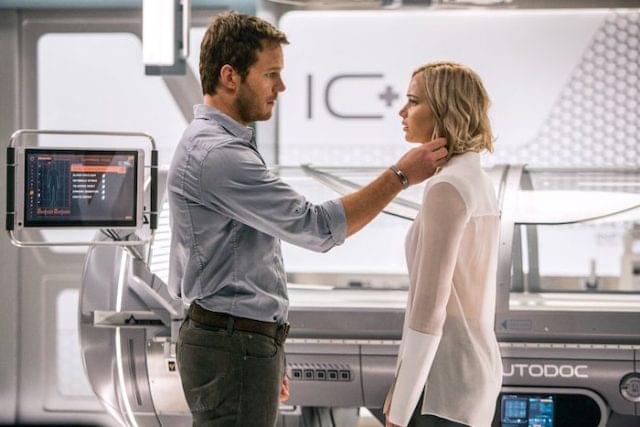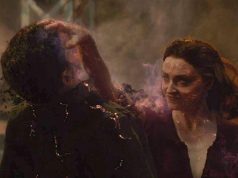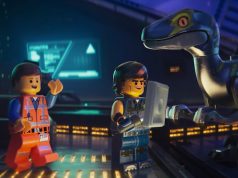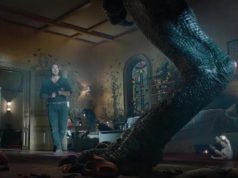
“Passengers” sets out on a course for being good, then detours and misses good’s orbit before landing clumsily on bad. It’s a waste of a rich premise, excellent special effects, and a charismatic cast. And it all could have been avoided with a simple course correction!
But we’ll come back to that. The setting is the Avalon, a commercial spaceship carrying 5,000 passengers from Earth to Homestead II, a colony billions of miles away. The trip takes 120 years, during which passengers and crew sleep blissfully in pods. The ship (on autopilot) is programmed to wake everybody up a few months before arrival, whereupon they’ll be trained in how to live on their new planet and enjoy some time socializing on what is essentially a giant cruise ship.
Well, there’s a snafu, and one passenger, a mechanic named Jim Preston (Chris Pratt), is roused 90 years early and can’t figure out how to re-start his pod. (Don’t you hate when you wake up before the alarm but can’t get back to sleep?) He’s the only conscious soul on board, and any crew members who’d be able to help are snoozing in a section of the ship Jim can’t access. Jim is going to die of old age before anyone even knows there’s been a problem. His only companion is a robot bartender named Arthur (Michael Sheen) who serves him drinks in one of the ship’s many entertainment facilities.
Wait a minute, you’re thinking. Isn’t this movie called “Passengers,” plural? And isn’t Jennifer Lawrence in it? When is a snafu going to wake her up?
Here’s where things go wrong. After enduring many weeks of loneliness and exhausting his ideas for “last man on earth” revelry, Jim notices a beautiful woman in a sleep pod. Her name is Aurora (like Sleeping Beauty), she’s a writer, and Jim does enough cyber-stalking of her to fall in love. He wants to wake her up and cure his loneliness, but he knows doing so will condemn her to die of old age with him. Arthur is no help on ethical matters (“Jim, these are not robot questions”), and so, after some (but not enough) internal struggle, Jim wakes her up.
Naturally, he lets her think her awakening was caused by a technical malfunction, like his was, and not premeditated long-game murder. If she knew the truth, she wouldn’t want to be his space-girlfriend. 🙁
Perhaps you can see the problem here. If so, you’re ahead of the film’s director (Morten Tyldum, “The Imitation Game”) and writer (Jon Spaihts, “Prometheus”), who evidently didn’t think this scenario would stick in anyone’s craw. But even apart from the queasy ethics, there’s the disappointment in seeing an intriguing sci-fi premise given the standard rom-com treatment, where a relationship is predicated on a lie and it’s only a matter of time before the lied-to party finds out and gets mad, and they break up, and the liar is sad until their reconciliation, which occurs without the liar ever really being punished for his misdeeds.
To be clear, Jim’s immoral behavior is not the problem, and wouldn’t have been an issue if the film had treated it with due seriousness. Many compelling films have been made about good people who make poor choices and are afflicted by the consequences. The problem is that there aren’t any consequences. The film treats Jim’s actions and subsequent lies the way most films treat a casual, regretted affair: bad for the relationship, sure, but eh, she’ll get over it. Buy her some flowers or something. (I wrote that as a joke, then remembered that Jim actually does raid the ship’s biosphere so he can plant Aurora an apology tree.)
The most frustrating aspect of this near-miss is that it was easily avoidable: Have the technical glitch wake them both up. It’s that simple. Let them be in this situation together, as equals. The story doesn’t need the conflict of Jim having lied to Aurora and Aurora feeling betrayed (AND CONDEMNED TO DEATH). There’s plenty of drama anyway: the malfunction that affected Jim’s pod is causing other things to go wrong, too, with potentially catastrophic results for everyone on board.
Much of the “we have to fix the ship” material is effective, with breathless space-walks and erratic artificial gravity providing respectable sci-fi thrills. There’s light comedy (and dark) sprinkled throughout, especially in the beginning. But the anti-climactic ending is rife with cop-outs, further diminishing the story’s impact, and while we like Pratt and Lawrence as performers, they’re wrong for these roles. Aurora, perpetually being acted upon rather than taking action, is a regressive choice for Lawrence after playing so many strong-willed characters, and Pratt’s cuddly persona doesn’t jibe with Jim’s selfishness — not even the minimal amount that the film acknowledges.
C- (1 hr., 56 min.; )





